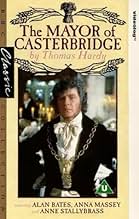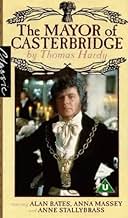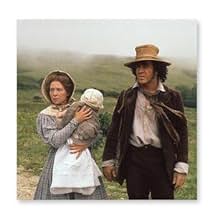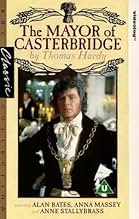Drunken Henchard sells wife at fair. Sober, he reforms, becomes mayor but past catches up when wife returns years later.Drunken Henchard sells wife at fair. Sober, he reforms, becomes mayor but past catches up when wife returns years later.Drunken Henchard sells wife at fair. Sober, he reforms, becomes mayor but past catches up when wife returns years later.
Browse episodes
7.9413
1
2
3
4
5
6
7
8
9
10
Featured reviews
A Story about karma
This brilliant adaption of a typically grim hardy novel was filmed in Corfe Castle, Dorset, but is set in Dorchester (aka Casterbridge). Given that it is 45 years old and it stands up well. Technically. Bates is of course the star. Sadly, Farfrae and Lucetta are poorly caste (the newer version being much better) but it is good to see the story told as written (mostly) and no one afraid to take a long time about it. It shows a man recovering from an early failure of character, who then does well. But then he lets himself down again and starts to fail. He makes a recovery of sorts, only to let himself (and others) down again. In short. This is a story about karma and how we control our own fortune. For those of us who are able to concentrate for an extended period of time it is well worth agonising over his life.
Better than the newer A&E version
This is an excellent British TV production of Thomas Hardy's classic novel. I watched it after I saw the updated version on A&E starring Ciaran Hinds (which is good too). This version is about 3 times as long and more true to the novel. Excellent acting and on location filming make this a winner. It's in a live play style. Its about a drunken husband who sells his wife and daughter to a sailor at a rural fair because he can't support them. Years later, this decision comes back to haunt him. Good morality story of how a bad decision can ruin people for life.
Outstanding adaptation of Hardian gloom
Another BBC masterpiece finally out on DVD. Hardy's world is shown in all its darkness, yet permeated by rays of hope. This rendition of the classic novel is brilliantly cast and well shot. You have to listen pretty hard to hear through the thick accents, but that patience is rewarded because nuances of the accents round out the characters.
Alan Bates is simply stunning as the heroic anti-hero Michael Henchard. A stupid decision made when he was a drunk 21-year-old comes back to haunt him 19 years later when the wife he sold returns to his town. The unfolding drama is about fatherhood, friendship, betrayal, and most importantly, the complexity of human characters. Bates is able to make you see inside his brain as he silently weighs courses of action between what his demons tempt him to do and what his angels urge him to do. Both sides win along the way as he redeems himself, only to then act rashly out of jealousy, embarrassment, or self-disgust.
The other characters are also well done, with Janet Maw playing the daughter who cannot understand her father until it is too late and Anna Massey playing the fallen woman who wishes to have her own life. Jack Galloway does a good job as the honest Scot, but I did not see any spark between Farfrae and Lucetta. The scenery and weather are always characters in Hardy's books, and here they enter the drama intermittently.
But this film in the end is all about Alan Bates. I love much of his other work but his Michael Henchard is the performance of a lifetime.
Alan Bates is simply stunning as the heroic anti-hero Michael Henchard. A stupid decision made when he was a drunk 21-year-old comes back to haunt him 19 years later when the wife he sold returns to his town. The unfolding drama is about fatherhood, friendship, betrayal, and most importantly, the complexity of human characters. Bates is able to make you see inside his brain as he silently weighs courses of action between what his demons tempt him to do and what his angels urge him to do. Both sides win along the way as he redeems himself, only to then act rashly out of jealousy, embarrassment, or self-disgust.
The other characters are also well done, with Janet Maw playing the daughter who cannot understand her father until it is too late and Anna Massey playing the fallen woman who wishes to have her own life. Jack Galloway does a good job as the honest Scot, but I did not see any spark between Farfrae and Lucetta. The scenery and weather are always characters in Hardy's books, and here they enter the drama intermittently.
But this film in the end is all about Alan Bates. I love much of his other work but his Michael Henchard is the performance of a lifetime.
Locations, quotations
'Casterbridge' is Dorchester, not Oxford. You can still stand in the street in Dorchester where Michael Henchard's wife stood, opposite the hotel where he was holding court as the mayor.
Two lines stand out from this memorable movie, lines for which I suppose Thomas Hardy must take most of the credit.
Henchard's first words on meeting his wife after twenty years: 'I don't drink.'
And his wife's explanation, when speaking of the man who had bid five guineas for her and her baby at the fairground auction: 'I couldn't leave him, Michael. Not after he'd paid all that money for me.'
(Both quotes from memory, but I think they are accurate.)
Two lines stand out from this memorable movie, lines for which I suppose Thomas Hardy must take most of the credit.
Henchard's first words on meeting his wife after twenty years: 'I don't drink.'
And his wife's explanation, when speaking of the man who had bid five guineas for her and her baby at the fairground auction: 'I couldn't leave him, Michael. Not after he'd paid all that money for me.'
(Both quotes from memory, but I think they are accurate.)
Surprisingly good adaptation by the ever-surprising Dennis Potter
Please pardon the substandard Americanism, but "who'd a thunk" that the insanely imaginative bete noire of British television writing, Dennis Potter, could have written such a disciplined, book-faithful, beautifully-paced script as this. He pays full and respectful homage to the great Thomas Hardy's masterpiece.
No repetition of the accolades of prior reviewers is needed here. They're spot on.
What I would like to see, if I had control of casting of both the 1978 and 2003 versions, is a redistribution of the cast. For this exercise, I need a time warp.
Understanding, for example, that Polly Walker, who plays Lucetta in 2003, was only 12 years old in 1978, I would have preferred her (as she was in 2003) to Anna Massey as Lucetta in 1978. Walker has some beauty and magnetism and is believable as a man- hungry "fallen woman." Massey was undeniably an excellent actress, but as a vamp she simply can't cut it. To think Farfrae or Henchard could be attracted to her sensually is laughable. The suspension of disbelief here is too much for me to make. (By the way, her miscasting as Laura in the Pallisers is equally disturbing, as there is NO spark between her and Donal McCann in that series.)
Then I'd grab Juliet Aubrey out of the 2003 version and cast her in place of Anne Stallybrass - Aubrey portrays Susan more sensitively, more skilfully.
Janet Maw is superb as Elizabeth-Jane, so I'd leave her there, and not import Jodhi May into 1978 - May is too stilted as E-J. Both Purefoy and Galloway are very good as Farfrae, but Goodman is so very good in the minor role of Jopp that I would pull him out of 2003 to replace Lacey,
And last, I leave it to you as to Hinds or Bates as Henchard. They both turn in the most remarkable performances of their careers in Mayor of C. And that's why it's such a pleasure to watch both versions. despite the dreadful editing of Hardy in 2003.
No repetition of the accolades of prior reviewers is needed here. They're spot on.
What I would like to see, if I had control of casting of both the 1978 and 2003 versions, is a redistribution of the cast. For this exercise, I need a time warp.
Understanding, for example, that Polly Walker, who plays Lucetta in 2003, was only 12 years old in 1978, I would have preferred her (as she was in 2003) to Anna Massey as Lucetta in 1978. Walker has some beauty and magnetism and is believable as a man- hungry "fallen woman." Massey was undeniably an excellent actress, but as a vamp she simply can't cut it. To think Farfrae or Henchard could be attracted to her sensually is laughable. The suspension of disbelief here is too much for me to make. (By the way, her miscasting as Laura in the Pallisers is equally disturbing, as there is NO spark between her and Donal McCann in that series.)
Then I'd grab Juliet Aubrey out of the 2003 version and cast her in place of Anne Stallybrass - Aubrey portrays Susan more sensitively, more skilfully.
Janet Maw is superb as Elizabeth-Jane, so I'd leave her there, and not import Jodhi May into 1978 - May is too stilted as E-J. Both Purefoy and Galloway are very good as Farfrae, but Goodman is so very good in the minor role of Jopp that I would pull him out of 2003 to replace Lacey,
And last, I leave it to you as to Hinds or Bates as Henchard. They both turn in the most remarkable performances of their careers in Mayor of C. And that's why it's such a pleasure to watch both versions. despite the dreadful editing of Hardy in 2003.
Did you know
- TriviaThis was one of the first major British television dramas to be shot entirely on videotape, using the new generation of portable video cameras and equipment for location footage. However, it was by no means the first BBC drama to do this, as series such as Doctor Who (1963) and Survivors (1975) had already used video for location footage as early as 1974-75.
- ConnectionsEdited into Masterpiece: The Mayor of Casterbridge: Part 1 (1978)
- How many seasons does The Mayor of Casterbridge have?Powered by Alexa
Details
Contribute to this page
Suggest an edit or add missing content





































